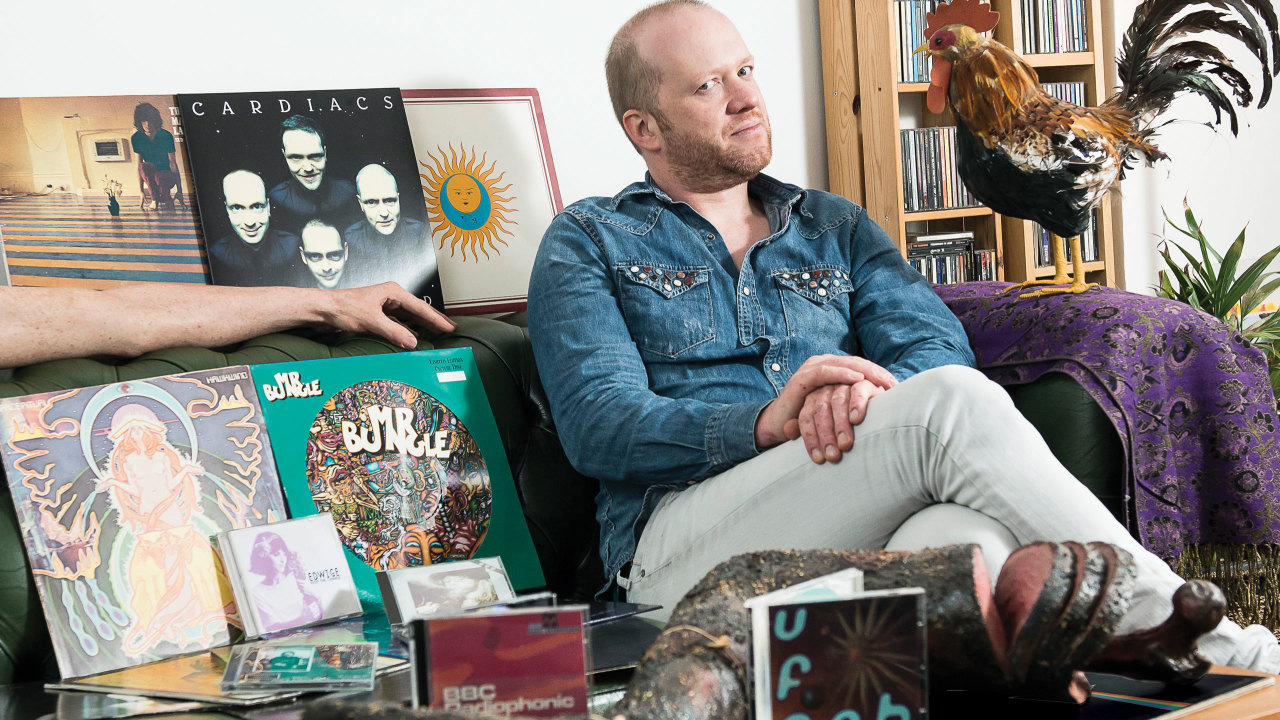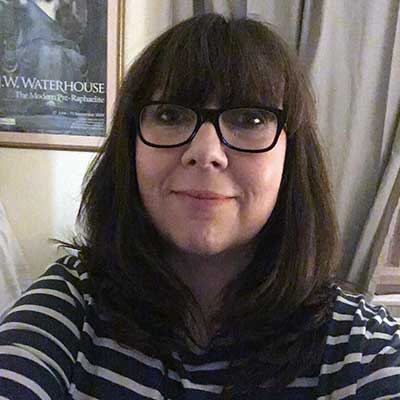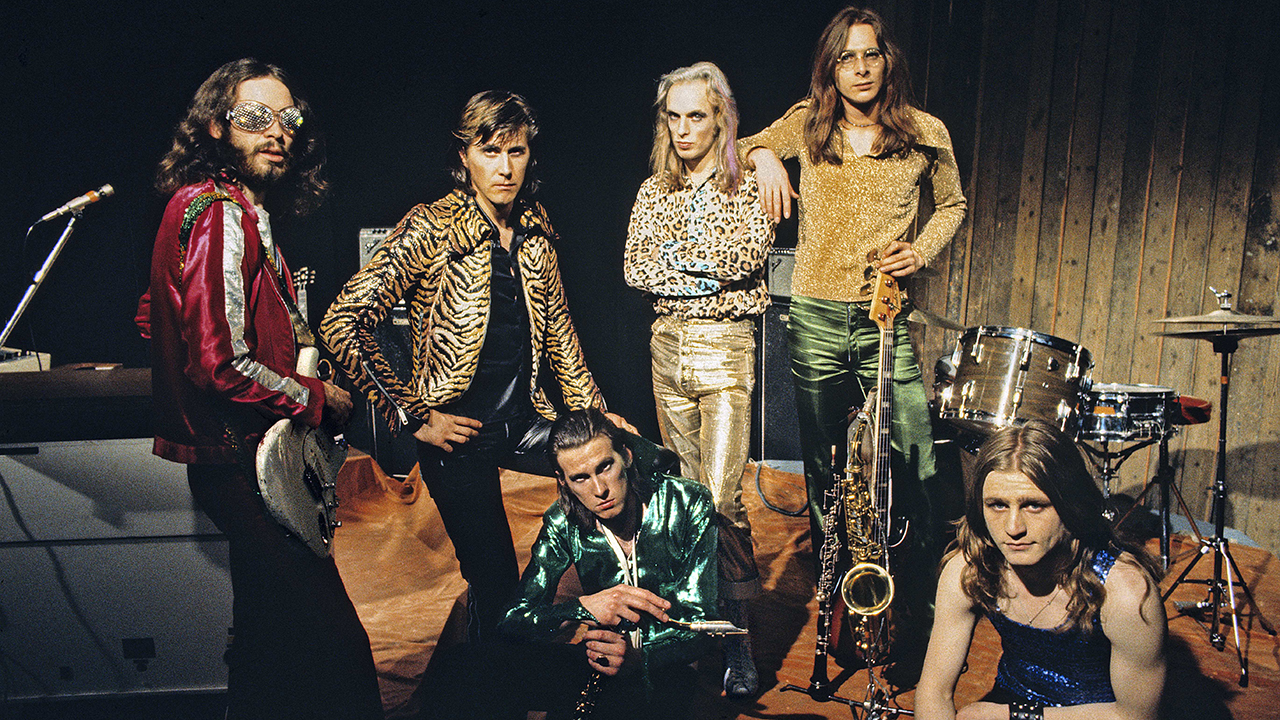My Record Collection: Steve Oram
With his Fripp-enhanced dialogue-free avant-garde horror flick Aaaaaaaah! just hitting our home screens, it’s a perfect time for a Sightseers’ tour of the actor-director’s sonic stimuli…

“Experimentalism is at the heart of what I like. Trying new ideas, weird time signatures, different genres, the music I’ve enjoyed the most has a freedom to it that I absolutely love. I suppose it starts with Michael Jackson. A mate’s older sister had Thriller, which we really loved, like most kids at that time. He’s really odd to listen to.
“I mean, what is that sound coming out of him? Those funny little barks. When you’re 10 years old and you hear that against Duran Duran or something it’s very different, intriguing. I grew up in Worcester and we were all quite into metal. There was AC/DC and Sabbath, then I got drawn into the drama of Iron Maiden against the backdrop of a quite nondescript town. I always loved horror films so The Number Of The Beast was really appealing to an 11 year-old boy. As I got into teenage years I played guitar in some bands. That’s when I heard Pink Floyd. There was no web access to these things like there is now, so you had what was the library (laughs), which would have about eight CDs. That’s where I first came across Saucerful Of Secrets and The Dark Side Of The Moon. I think that led to trying out King Crimson for the first time. In The Court Of The Crimson King, that’s an incredible album, and still one of my favourites, ever. I loved Robert’s guitar playing, it was quite understated and I understood this guy was a genius, but tried to copy his solos anyway (laughs). Then you get Larks’ Tongues In Aspic; I think it’s just the perfect avant-garde-stroke-melodic album you could ever hear. Frippertronics is entirely a continuation of some stuff we’ll talk about in a bit, my ambient phase, which I’ve loved since finding Crimson. What you can do with a guitar and a bank of effects is really delicate and moving.
Robert gave me a memory stick of music saying, ‘You can use that for free.’
At 18 I got into Syd Barrett. I’d started to think that, against things like King Crimson, Floyd might be a bit boring. But he’s the heart of Floyd and when he left that’s when it got a bit boring. The Madcap Laughs is a very strange album, impulsive and heartbreaking, but I actually think it’s really well crafted and he had an incredible way with words.
Studying Film and English at college in Norwich I was in a group of friends who were musicians – we’d play things that were a bit more avant-garde with a performance aspect, which I’d use later on. My mate James introduced me to the Cardiacs’ Songs For Ships And Irons, which I owned on cassette, but don’t have any longer, sadly. That band were the maddening, weird soundtrack to my late adolescence. Tim Smith’s a genius, our Captain Beefheart, but not celebrated like he should be. We saw them live a couple of times and they were so intense and funny. I was amazed by the stagecraft – they had these weird black faces and Tim Smith would hit his brother and tell him to shut up. In the early 90s music was quite straightforward but Cardiacs opened up a lot of possibilities.
James was also responsible for getting me into Mr Bungle, kindred spirits to Cardiacs, but doing things in that way that only American avant-gardists can! We went to see them at the Astoria in 1995; they’d do Beach Boys melodies with very odd styles of music all the time, and were really, really funny. That comes from a place that says, fuck you, I’m just going to do this! You sensed the humour all the time. In fact, probably all of my choices today have humour in them, or euphoria linked to humour, that’s essential.
Similar to Mr Bungle are a recent discovery for me, Estradasphere. An amorphous bunch of maybe 10 musicians, this is weird gypsy music from California. But whereas Mr Bungle and Cardiacs have that madness – and you might want to have a little lie down after listening to them – Estradasphere have a gentleness, and it’s almost like a new form of music as they go from six minutes of jazz to a death metal section. Get Buck Fever and The Silent Elk Of Yesterday and have your mind blown.
Sign up below to get the latest from Prog, plus exclusive special offers, direct to your inbox!
College saw my ambient era, too. I went from Frippertronics to Tangerine Dream to The Orb. The latter were of the best live bands I’ve ever seen: there’s drama and a narrative in what they do. The first time I saw them, in a small place in King’s Cross, it started really low key, a guy just came out of a back door and started messing around with a synth. I was sitting there going, oh yeah, I’ll just have a pint, take in what’s going on, and then it built and built, until everyone was going a bit insane, and The Orb were just tweaking all our buttons. That’s genius, but also craft and experience. My favourite record is U.F.Orb. A headphone album, but also – at the time – about getting off your face.
That leads to Delia Derbyshire and The Radiophonic Workshop. It took a bit of investigating, but when I found their work I realised it was the soundtrack to my childhood – Doctor Who and the weirdness of the theme tunes they were allowed to do, like tape loop experiments or noise feedback for East Midlands Today or something. What they did was art, and it created a landscape that subtly pervaded a generation. Daphne Oram is another of these incredible ladies, sadly not related to me. Rock is mainly blokes, let’s face it. These women need to be revered as the pioneers of ambient and electronic music.
Who’s new? Edwige. This is someone I first saw busking on the underground. She plays guitar and has this incredible, ethereal singing voice – touches of Kate Bush, but a lot stranger. I found her website and bought all her CDs. I think she is an undiscovered genius. Someone who nearly, but doesn’t quite, fit the mainstream. Her songs key into the subconscious in an unusual way, she’s kind of joyous but unsettling at the same time.
And so back to Robert Fripp. I’d got Toyah [Willcox, aka Mrs Fripp for those living under a rock] involved with my film, Aaaaaaaah! – I’m a huge fan of Jubilee and Quadrophenia so I thought I’d just give it a go to ask her – and after we’d been filming she asked me round to their house for lunch. I showed them a few rough cuts of scenes that she was in and Robert seemed to really enjoy them. He said, ‘What are you doing for the music?’ I said, ‘Well, I don’t quite know.’ He went out of the room and came back with a memory stick with 15 hours of ProjeKcts material on. He said, ‘You can use any of that for free.’ I’ve never had a moment of generosity like that before from someone I’ve only met that day. It took 15 hours of driving up and down the motorway in a van with it on to get my head round it all. As soon as I put it to picture it just worked. That was quite a lovely moment in my creative life.”
Aaaaaaaah! is available via video on demand. Find out more at www.frightfestpresents.com/aaah.
- Meet the best turntables for your record collection
- Smaller budget? No problem! These are the best budget turntables
Jo is a journalist, podcaster, event host and music industry lecturer who joined Kerrang! in 1999 and then the dark side – Prog – a decade later as Deputy Editor. Jo's had tea with Robert Fripp, touched Ian Anderson's favourite flute (!) and asked Suzi Quatro what one wears under a leather catsuit. Jo is now Associate Editor of Prog, and a regular contributor to Classic Rock. She continues to spread the experimental and psychedelic music-based word amid unsuspecting students at BIMM Institute London and can be occasionally heard polluting the BBC Radio airwaves as a pop and rock pundit. Steven Wilson still owes her £3, which he borrowed to pay for parking before a King Crimson show in Aylesbury.

